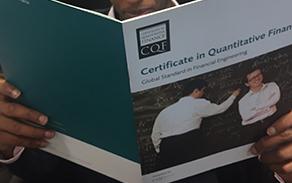Five Key Reasons to Choose the CQF

Download the brochure to find out more about the CQF.
The Certificate in Quantitative Finance (CQF) was founded by Dr. Paul Wilmott in 2003 to fill the gap between academia and industry. He understood that professionals want an excellent educational experience without having to return to full-time education. The CQF is a 6-month, part-time program delivered live online globally. Most delegates continue to hold a full-time job and maintain their ability to earn while completing the program. Within six months they gain a comprehensive quantitative finance skill set that will help accelerate their careers.
Explore five key reasons why the CQF is the largest professional quant qualification in the world and why thousands of professionals have chosen the program to learn essential quant skills.
1) Syllabus and structure
The CQF is made up of six modules, followed by two advanced electives of the delegate’s choosing. The syllabus is updated quarterly in consultation with faculty, an advisory board, and senior alumni practitioners, to ensure that the content is focused on cutting-edge techniques that are being used in financial markets today. For example, as machine learning and data science have become more prominent, the CQF has expanded to include modules on these techniques, including supervised, unsupervised, and reinforcement learning, deep learning, neural nets, natural language processing, and algo trading.
In addition, employers are often looking for programming skills, so the CQF has evolved to provide a deeper background in this area via a series of live online Python labs, in which delegates work on building models that have been covered in lectures. These newer components have been very popular and alumni report that immersion in these fields has proven to be valuable in both their short-term job searches and their long-term careers.
My decision to enroll was driven by the CQF curriculum, which ranges from foundational concepts to advanced practical applications in financial markets.
Manoj Rathi, Senior Customer Journey Expert - Market Risk, ING
2) Faculty and support
Access to industry experts is one of the hallmarks of the CQF. Each module is taught by real-world practitioners who are creating, refining, and critiquing the use of these models and methods in industry. Faculty members include Dr. Paul Wilmott, Dr. Espen Gaarder Haug, Dr. Peter Jaeckel, Dr. Claus Huber, Dr. Marc Henrard, Dr. Sébastien Lleo, Dr. Jon Gregory, Dr. Yves Hilpisch, and others.
The CQF faculty are also deeply engaged in the program support. While some students have a solid foundation in one or more areas of the curriculum, the learning curve is steep at points for everyone, and one-to-one faculty support as well as additional program support is available for each stage of the program.
CQF faculty are available via email, phone, and video conference. They also run weekly, online workshops and labs that cover key concepts and specific technical skills, such as select mathematical methods and programming in Python. Delegates also have access to a private discussion forum and are encouraged to form dedicated study groups with other CQF delegates around the world. Many delegates build relationships with their CQF peers and go on to use these connections throughout their careers.
With the CQF, you still learn the theory, but the lecturer is from a cohort of professional people who work in industry, so they focus on real-life applications in quant finance.
Ben Payet, Investment Strategist, JP Morgan
3) Industry focus and learning methodology
Time is of the essence in finance and many firms favor job applicants who can demonstrate the skills and understanding to hit the ground running. The CQF curriculum is centered on teaching the theory and the practical implementation of quant finance techniques. The program methodology is firmly rooted in a rigorous process of 1) learn, 2) review, and 3) implement.
Key concepts and tools are presented early in the program, with repeated review within each module. Emphasis is placed on both understanding the theory and gaining experience with direct implementation of each model. This approach ensures that CQF delegates develop ‘desk-ready’ skills by the end of the program. Delegates also complete practical modular exams to reinforce what they have learned, culminating in an in-depth project of their choosing to ensure they can demonstrate their skills in real-world scenarios. Many alumni report that following the completion of their final project, they were able to apply relevant techniques to similar problems with confidence, an achievement that set them apart in job interviews or for promotions.
One of the most valuable aspects of the CQF is the ability to immediately bring new knowledge into the workplace, allowing you to test ideas on data that is directly relevant to your work.
Maxim Popikov, Portfolio Manager, Quoniam Asset Management GmbH
4) Study time and flexibility
Flexibility is a key component of the CQF; all lectures are delivered live online and uploaded within 24 hours to the CQF portal, exam extensions are available throughout, and delegates can defer the program over six cohorts (three full years) at no extra cost. The program is also part-time to enable delegates to maintain a full-time career alongside their studies.
These options ensure that nothing on the logistical front will prevent delegates from earning the qualification. Many CQF alumni underscore the importance of the flexible nature of the program.
CQF delegates can also specialize towards their individual career goals. As part of module six, delegates select two advanced electives from an extensive list of choices to explore topics that are most relevant to them. The final practical project is also based on the electives and gives delegates an opportunity to apply their new skills to a real-world scenario.
It was clearly a very practical approach to learning, it was part-time, complementary to my work schedule, and could be completed in six months. I was already very accustomed to working and studying at the same time, so this was simply a continuation of my normal life.
Leticia Mortoza, Senior Quant, Swedbank
5) Continued professional development and the CQF network
As part of the commitment to lifelong learning, CQF alumni have permanent access to a vast and ever- growing library of additional lectures as well as all the materials from the latest CQF cohort. As new techniques emerge in quantitative finance, practitioners are invited to give alumni lectures on hot topics, which are delivered live online and uploaded to the library. This ensures that delegates are kept up to date on the latest industry practices throughout their career.
Delegates are also invited to join the CQF Institute, the awarding body for the CQF and a global membership organization dedicated to building and educating the quant community. The Institute hosts global and regional events, including talks, workshops, and conferences throughout the year. These events give delegates and alumni the opportunity to foster new relationships and discover the latest quant finance innovations as part of a global quant community.
I access CQF Lifelong Learning to keep myself updated with the latest trends in the industry. This is a great resource for working professionals who follow cutting-edge industry developments closely.
Yuehui Liang, Manager - Risk Analytics and Modelling, UOB
Conclusion
The CQF is an outstanding choice for those who are seeking to enter into or continue a career in quantitative finance, with the assurance of a solid, hands-on educational experience. The success of the CQF is intertwined with the success of its graduates– from the development of relevant and adaptable skills, to peer networking and industry connections, to lifelong learning, the CQF encourages its delegates and alumni to stay connected and benefit from the growing quant community around the program.
The CQF requires a lot of discipline and if you have an intense job, it will push you quite hard. But if you have a passion for learning, and especially for the math behind the models in finance, you will truly benefit from the experience.
Max Bocchini, Head of Insurance and Capital Markets Sectors, Capgemini Invent
To find out how you could transform your career with the CQF program, please download a brochure or join the next online information session to hear more and ask questions to the CQF Program Director.




